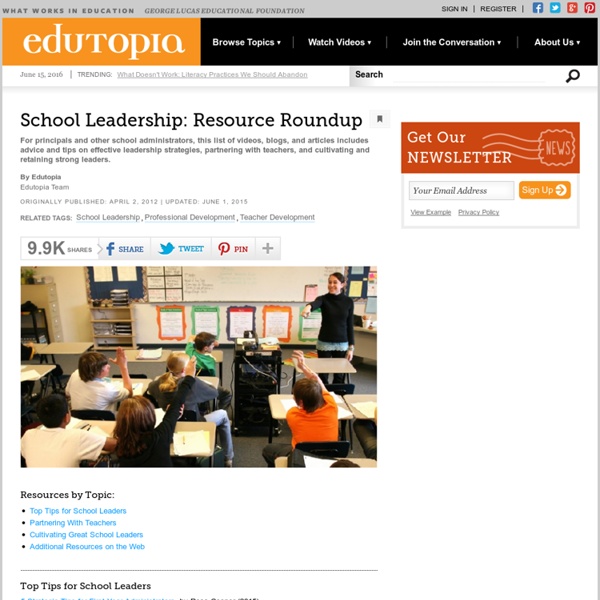School Leadership: Resource Roundup
Facebook Edutopia on Facebook Twitter Edutopia on Twitter Google+ Pinterest Edutopia on Pinterest WHAT WORKS IN EDUCATION The George Lucas Educational Foundation Top Tips for School Leaders 5 Strategic Tips for First-Year Administrators, by Ross Cooper (2015) For admins just starting out, it's helpful to establish relationships, visit classrooms, understand others, flatten the hierarchy, and become an active social media presence. 8 Top Tips for Highly Effective PD, by Vicki Davis (2015) Among the top strategies for highly effective professional development are making it useful, making it relevant, and making sure that teachers start practicing it ASAP. 8 Tips to Create a Twitter-Driven School Culture, by Elana Leoni (2014) Administrators can create a more connected school culture by modeling Twitter use and encouraging staff to work, play, and learn through the medium. Back to Top Partnering With Teachers Cultivating Great School Leaders
20 Education Administrator Blogs You Should Start Following Right Now
It’s not easy being a school administrator. As leader of your school or department, it may be difficult to find peers you can confide in, discuss challenges or get insights. That’s why it’s great to tap into the opinions, knowledge and research of education administrator blogs. Most of these blogs are written for and by administrators, and can open up a conversation and help you connect with others who, like you, work to provide the best educational opportunities for your students. Image via Flickr by Christian Schnettelker Here’s our list of the 20 great blogs to check out, and what makes them intriguing: Connected Principals –this collection of contributions from school administrators who want to share knowledge, learn together and lead effectively. Edublog lists its top education websites and blogs in its Edublog awards. This variety of blogs from experts representing all aspects of education gives school administrators a wealth of information to build upon.
34112dd06a982954b4056276bc402a08
A PLN Quick Start Guide
Updated 4/17/13The concept of a PLN has been around for a very long time. PLN's back in the day consisted of individuals with the same professional interests engaging in mostly face to face communication. Fast forward a good amount of years and enter the internet. Image Credit Most educators I talk to have no idea where to begin when attempting to create a PLN that meets their teaching and learning needs. For more information on PLN's check out this fantastic video!
ASCD 2013 Professional Development Planner
As educators gear up to return to school in the fall, ASCD has compiled a collection of hard-hitting resources to enable educators to implement innovative teaching and learning strategies for the 2013–14 school year. We’ve prepared a professional development planner for your use with our 2013 Summer Catalog. Follow the steps and choose your resources to develop your personally differentiated PD plan. Browse our online store today.
Dr. Brad Gustafson | Educational Speaker & Consultant
How To Coach Through The Stages of Learning Infographic
Other Infographics One of the roles of a coach is to be a guide and a support while the coachee is developing a new skill or learning a new concept. But often times, coachees are blind to the need for development and learning. The coach must then initiate a discussion with the coachee to help them understand that a need or development opportunity exists. This effort begins the first of the four stages of learning, based on elements of the Johari Window, where a coach supports the coachee throughout the process of progressing from incompetence to competence in a skill or concept. Determine where the person is in the learning processCoach the person according to the place in the learning processReevaluate where the person is in the learning process and continue to coach them towards unconcious competence Via: www.cmoe.com Embed This Education Infographic on your Site or Blog!
Give. Risk. Learn. Trust.
3f2fbeb9f8c75204a3e5372680753ae2
RSU2: Entering a New Stage in Building a High Quality Proficiency-Based District
This post is part of the Maine Road Trip series. This is the first post on my conversations at RSU2 in Maine. RSU2 is a district that has been staying the course, even through two superintendent changes (Don Siviski is now at Center for Center for Secondary School Redesign; Virgel Hammonds is now at KnowledgeWorks; and Bill Zima, previously the principal at Mt. Ararat Middle School, is now the superintendent). This says a lot about the school board’s commitment to having each and every student be prepared for college and careers. Given that they are one of the districts with the most experience with competency education (Chugach has the most experience, followed by Lindsay), my visit to RSU2 was much more focused on conversations with the district leadership team, principals, and teachers rather than classroom visits. It takes a load of leadership and extra effort to transform a traditional district to personalized, proficiency-based learning. Tips for Implementation Start with the why.
Related:
Related:



